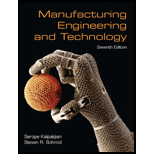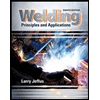
Manufacturing Engineering & Technology
7th Edition
ISBN: 9780133128741
Author: Serope Kalpakjian, Steven Schmid
Publisher: Prentice Hall
expand_more
expand_more
format_list_bulleted
Textbook Question
Chapter 16, Problem 19RQ
What is hot stamping? For what materials is it used?
Expert Solution & Answer
Want to see the full answer?
Check out a sample textbook solution
Students have asked these similar questions
Qu 5 Determine the carburizing time necessary to achieve a carbon concentration of 0.30 wt% at a position 4 mm into an iron carbon alloy that initially contains 0.10 wt% C. The surface concentration is to be maintained at 0.90 wt% C, and the treatment is to be conducted at 1100°C. Use the data for the diffusion of
carbon into y-iron: Do = 2.3 x10-5 m2/s and Qd = 148,000 J/mol. Express your answer in hours to three significant figures.
show all work step by step problems formula material science
(Read Question)
In figure A, the homogeneous rod of constant cross section is attached to unyielding supports. In figure B, a homogeneous bar with a cross-sectional area of 600 mm2 is attached to rigid supports. The bar carries the axial loads P1 = 20 kN and P2 = 60 kN, as shown.1. In figure A, derive the expression that calculates the reaction R1 in terms of P, and the given dimensions.2. In figure B, calculate the reaction (kN) at A.3. In figure B, calculate the maximum axial stress (MPa) in the rod.
Chapter 16 Solutions
Manufacturing Engineering & Technology
Ch. 16 - How does sheet-metal forming differ from rolling,...Ch. 16 - What causes burrs? How can they be reduced or...Ch. 16 - Prob. 3RQCh. 16 - Describe the difference between compound,...Ch. 16 - Describe the characteristics of sheet metals that...Ch. 16 - Describe the features of forming-limit diagrams...Ch. 16 - List the properties of materials that influence...Ch. 16 - Give one specific application for each of the...Ch. 16 - Why do tubes buckle when bent? What is the effect...Ch. 16 - Define normal anisotropy, and explain why it is...
Ch. 16 - Describe earing and why it occurs.Ch. 16 - What are the advantages of rubber forming? Which...Ch. 16 - Explain the difference between deep drawing and...Ch. 16 - How is roll forming fundamentally different from...Ch. 16 - What is nesting? What is its significance?Ch. 16 - Describe the differences between compound,...Ch. 16 - What is microforming?Ch. 16 - Explain the advantages of superplastic forming.Ch. 16 - What is hot stamping? For what materials is it...Ch. 16 - What is springback? What is negative springback?Ch. 16 - Explain the differences that you have observed...Ch. 16 - Take any three topics from Chapter 2, and, with...Ch. 16 - Do the same as for Problem 16.22, but for Chapter...Ch. 16 - Identify the material and process variables that...Ch. 16 - Explain why springback in bending depends on yield...Ch. 16 - Explain why cupping tests may not predict well the...Ch. 16 - Identify the factors that influence the...Ch. 16 - Why are the beads in Fig. 16.36b placed in those...Ch. 16 - A general rule for dimensional relationships for...Ch. 16 - Section 16.2 stated that the punch stripping force...Ch. 16 - Is it possible to have ironing take place in an...Ch. 16 - Note the roughness of the periphery of the flanged...Ch. 16 - What recommendations would you make in order to...Ch. 16 - It has been stated that the quality of the sheared...Ch. 16 - Give several specific examples from this chapter...Ch. 16 - As you can see, some of the operations described...Ch. 16 - Through changes in clamping or die design, it is...Ch. 16 - How would you produce the part shown in Fig....Ch. 16 - It has been stated that the thicker the sheet...Ch. 16 - Prob. 41QTPCh. 16 - Calculate the value of R in Problem 16.41. Will...Ch. 16 - Estimate the limiting drawing ratio for the...Ch. 16 - Using Eq. (16.15) and the K value for TNT, plot...Ch. 16 - Section 16.5 states that the k values in bend...Ch. 16 - For explosive forming, calculate the peak pressure...Ch. 16 - Measure the respective areas of the solid outlines...Ch. 16 - Plot Eq. (16.6) in terms of the elastic modulus,...Ch. 16 - What is the minimum bend radius for a 1.0-mm-thick...Ch. 16 - Survey the technical literature and explain the...Ch. 16 - Using the data in Table 16.3 and referring to Eq....Ch. 16 - What is the force required to punch a square hole...Ch. 16 - In Case Study 16.2, it was stated that the reason...Ch. 16 - A cup is being drawn from a sheet metal that has a...Ch. 16 - Prob. 55QTPCh. 16 - Figure P16.57 shows a parabolic profile that will...Ch. 16 - Prob. 59SDPCh. 16 - Consider several shapes to be blanked from a large...Ch. 16 - Prob. 61SDPCh. 16 - Many axisymmetric missile bodies are made by...Ch. 16 - Metal cans are either two-piece (in which the...Ch. 16 - The design shown in Fig. P16.65 is proposed for a...Ch. 16 - Suggest consumer-product designs that could...Ch. 16 - How would you produce the part shown in Fig. 16.44...Ch. 16 - Using a ball-peen hammer, strike the surface of...Ch. 16 - Inspect a common paper punch and observe the shape...Ch. 16 - Obtain an aluminum beverage can and slit it in...Ch. 16 - Prob. 71SDPCh. 16 - Prob. 73SDPCh. 16 - On the basis of experiments, it has been suggested...Ch. 16 - Design a box that will contain a 4-in. 6-in. ...Ch. 16 - Repeat Problem 16.77, but design the box from a...
Knowledge Booster
Learn more about
Need a deep-dive on the concept behind this application? Look no further. Learn more about this topic, mechanical-engineering and related others by exploring similar questions and additional content below.Similar questions
- (Read image)arrow_forward(Read Image)arrow_forwardM16x2 grade 8.8 bolts No. 25 C1- Q.2. The figure is a cross section of a grade 25 cast-iron pressure vessel. A total of N, M16x2.0 grade 8.8 bolts are to be used to resist a separating force of 160 kN. (a) Determine ks, km, and C. (b) Find the number of bolts required for a load factor of 2 where the bolts may be reused when the joint 19 mm is taken apart. (c) with the number of bolts obtained in (b), determine the realized load factor for overload, the yielding factor of safety, and the separation factor of safety. 19 mmarrow_forward
- Problem4. The thin uniform disk of mass m = 1-kg and radius R = 0.1m spins about the bent shaft OG with the angular speed w2 = 20 rad/s. At the same time, the shaft rotates about the z-axis with the angular speed 001 = 10 rad/s. The angle between the bent portion of the shaft and the z-axis is ẞ = 35°. The mass of the shaft is negligible compared to the mass of the disk. a. Find the angular momentum of the disk with respect to point G, based on the axis orientation as shown. Include an MVD in your solution. b. Find the angular momentum of the disk with respect to point O, based on the axis orientation as shown. (Note: O is NOT the center of fixed-point rotation.) c. Find the kinetic energy of the assembly. z R R 002 2R x Answer: H = -0.046ĵ-0.040 kg-m²/sec Ho=-0.146-0.015 kg-m²/sec T 0.518 N-m =arrow_forwardProblem 3. The assembly shown consists of a solid sphere of mass m and the uniform slender rod of the same mass, both of which are welded to the shaft. The assembly is rotating with angular velocity w at a particular moment. Find the angular momentum with respect to point O, in terms of the axes shown. Answer: Ñ。 = ½mc²wcosßsinßĵ + (}{mr²w + 2mb²w + ½ mc²wcos²ß) k 3 m r b 2 C لا marrow_forwardOnly question 2arrow_forward
- Only question 1arrow_forwardOnly question 3arrow_forwardI have Euler parameters that describe the orientation of N relative to Q, e = -0.7071*n3, e4 = 0.7071. I have Euler parameters that describe the orientation of U relative to N, e = -1/sqrt(3)*n1, e4 = sqrt(2/3). After using euler parameter rule of successive rotations, I get euler parameters that describe the orientation of U relative to Q, e = -0.4082*n1 - 0.4082*n2 - 0.5774*n3. I need euler parameters that describe the orientation of U relative to Q in vector basis of q instead of n. How do I get that?arrow_forward
- Describe at least 4 processes in engineering where control charts are (or should be) appliedarrow_forwardDescribe at least two (2) processes where control charts are (or should be) applied.arrow_forwardProblem 3: A cube-shaped spacecraft is in a circular Earth orbit. Let N (n,) be inertial and the spacecraft is denoted S (ŝ₁). The spacecraft is described such that ¯½º = J ŝ₁ŝ₁ + J ŝ₂§₂ + J §¸Ŝ3 Location of the spacecraft in the orbit is determined by the orbit-fixed unit vectors ê, that are oriented by the angle (Qt), where is a constant angular rate. 52 €3 3> 2t 55 Λ Из At the instant when Qt = 90°, the spacecraft S is oriented relative to the orbit such that 8₁ = 0° Space-three 1-2-3 angles 0₂ = 60° and ES = $₂ rad/s 0₁ = 135° (a) At this instant, determine the direction cosine matrix that describes the orientation of the spacecraft with respect to the inertial frame N.arrow_forward
arrow_back_ios
SEE MORE QUESTIONS
arrow_forward_ios
Recommended textbooks for you
 Welding: Principles and Applications (MindTap Cou...Mechanical EngineeringISBN:9781305494695Author:Larry JeffusPublisher:Cengage Learning
Welding: Principles and Applications (MindTap Cou...Mechanical EngineeringISBN:9781305494695Author:Larry JeffusPublisher:Cengage Learning

Welding: Principles and Applications (MindTap Cou...
Mechanical Engineering
ISBN:9781305494695
Author:Larry Jeffus
Publisher:Cengage Learning
Relationship Between Elastic Constants and Connecting Equations; Author: Engineers Academy;https://www.youtube.com/watch?v=whW5PnM7Pug;License: Standard Youtube License